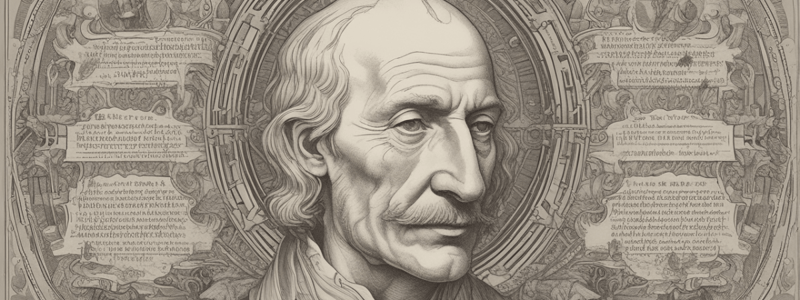Podcast
Questions and Answers
What is the main distinction made by John Locke regarding the qualities of physical bodies?
What is the main distinction made by John Locke regarding the qualities of physical bodies?
- Primary qualities are moral, while secondary qualities are logical
- Primary qualities are properties of physical bodies, while secondary qualities are sensations caused by those bodies (correct)
- Primary qualities are mathematical, while secondary qualities are empirical
- Primary qualities are inherent in the mind, while secondary qualities are properties of physical bodies
What is the source of all ideas, according to John Locke?
What is the source of all ideas, according to John Locke?
- Reason and experience
- Innate ideas and sensory stimulation
- Intuition and instinct
- Sensation and reflection (correct)
What is the term used to describe the rudimentary mental experience that results from the stimulation of one or more sense receptors?
What is the term used to describe the rudimentary mental experience that results from the stimulation of one or more sense receptors?
- Reflection
- Sensation (correct)
- Perception
- Intuition
What is the assumption that John Locke rejects, according to which all humans are born with certain ideas?
What is the assumption that John Locke rejects, according to which all humans are born with certain ideas?
What is the term used to describe the ability to use the powers of the mind to creatively rearrange ideas derived from sensory experience?
What is the term used to describe the ability to use the powers of the mind to creatively rearrange ideas derived from sensory experience?
What did Locke believe was essential for effective learning?
What did Locke believe was essential for effective learning?
What was Locke's advice for dealing with irrational fears?
What was Locke's advice for dealing with irrational fears?
What was Locke's view on the notion of innate moral principles?
What was Locke's view on the notion of innate moral principles?
What was the focus of Locke's political writings?
What was the focus of Locke's political writings?
What was the result of Locke's ideas on education when he first proposed them?
What was the result of Locke's ideas on education when he first proposed them?
What does Locke consider as the 'greatest good'?
What does Locke consider as the 'greatest good'?
What is the main difference between primary and secondary qualities according to Locke?
What is the main difference between primary and secondary qualities according to Locke?
What is Locke's explanation for the faulty beliefs that result from accidents of time or circumstance?
What is Locke's explanation for the faulty beliefs that result from accidents of time or circumstance?
What is Locke's approach to education, as reflected in his book?
What is Locke's approach to education, as reflected in his book?
What is the purpose of Locke's 'hardening' process in education?
What is the purpose of Locke's 'hardening' process in education?
Flashcards are hidden until you start studying
Study Notes
John Locke's Philosophy
- Denied the existence of innate ideas, assuming instead that the mind has nativistically determined powers.
- Distinguished between primary qualities (cause sensations that correspond to actual attributes of physical bodies) and secondary qualities (cause sensations with no counterparts in the physical world).
Types of Ideas
- Ideas caused by sensory stimulation
- Ideas caused by reflection
- Simple ideas (mental remnants of sensations that cannot be divided or analyzed further)
- Complex ideas (configurations of simple ideas, can be analyzed into component parts)
Mind-Body Distinction
- Accepted a mind-body dualism, rejecting Hobbes's physical monism (materialism)
- Did not explain how physical stimulation causes mental ideas, simply stated that it does
Empiricism
- Shaped most of subsequent British empiricism
- Believed that all ideas come from either sensation or reflection
- Emphasized the importance of experience and observation in shaping our understanding of the world
Emotions
- Believed that feelings of pleasure or pain accompany ideas
- Thought that other passions (emotions) are derived from the two basic feelings of pleasure and pain
- Maintained that humans are motivated by the search for pleasure and the avoidance of pain
Primary and Secondary Qualities
- Primary qualities: have the power to create in us ideas that correspond to actual attributes of physical objects (e.g., solidity, extension, shape, motion or rest, and quantity)
- Secondary qualities: have the power to produce ideas, but the ideas they produce do not correspond to anything in the physical world (e.g., color, sound, temperature, and taste)
Paradox of the Basins
- Observed that warm water can feel either hot or cold depending on whether a hand is first placed in hot water or cold water
- Used this example to illustrate the difference between primary and secondary qualities
Association of Ideas
- Used association to explain the faulty beliefs that can result from accidents of time or circumstance
- Believed that ideas that succeed each other because of natural or rational reasons represent true knowledge, but ideas that become associated fortuitously can result in unreasonable beliefs
Education
- Insisted that nurture (experience) is more important than nature (innate ability) for character development
- Encouraged parents to increase stress tolerance in their children through "hardening" (e.g., sleeping on hard beds, exposure to moderate amounts of coldness and wetness)
- Advocated for mild physical punishment of students, but not severe physical punishment
- Believed that teachers should make the learning experience as pleasant as possible to encourage lifelong learning
Government
- Attacked the notion of innate moral principles and encouraged people to seek the truth for themselves
- Proposed a government by and for the people, challenging the divine right of kings
- Influential in the drafting of the U.S. Declaration of Independence
Studying That Suits You
Use AI to generate personalized quizzes and flashcards to suit your learning preferences.




